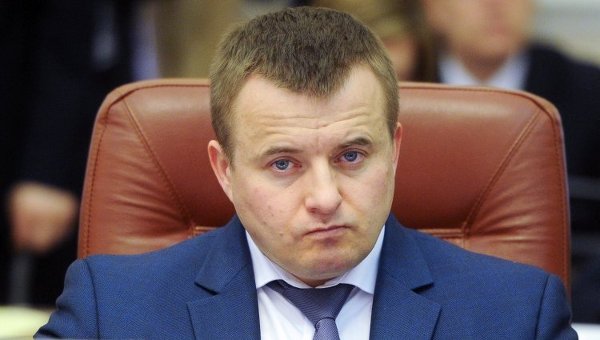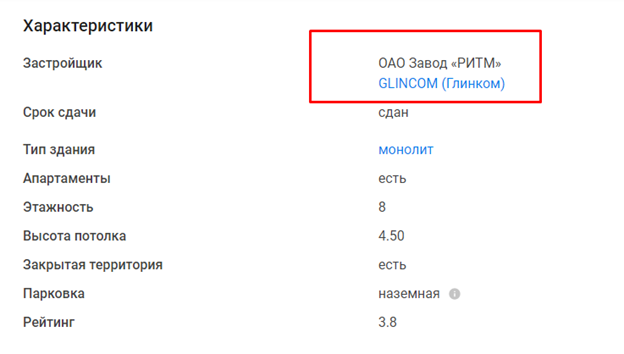Vladimir Demchishin
In mid-September, the Ministry of Internal Affairs became sharply interested in the purchase of coal by the Centerenergo company. By order of Arsen Avakov (Read more about him in the article Arsen Avakov: the criminal past of the Minister of Internal Affairs) the accounts of several private and public companies were arrested on suspicion of cooperation with the self-proclaimed republics of the DPR and LPR. According to the Ministry of Internal Affairs, through several accounts opened in different banks, Centrenergo accepted payment for coal sold at inflated prices. The Ministry of Internal Affairs named Igor Balabanov, the ex-director of Centerenergo, who was fired on August 31, as the main organizer of the scheme. On the same day, three criminal cases were opened: on the fact of fictitious entrepreneurship, abuse of official powers and legalization of proceeds from crime. Each of these criminal cases could hurt the head of the Ministry of Energy, Vladimir Demchishin, at whose suggestion Balabanov came to the department as head of Centrenergo. Why the Ministry of Internal Affairs took on Centerenergo right now is not known for sure, however, in view of the brewing conflict between Arseniy Yatsenyuk and Petro Poroshenko, whose henchmen are Arsen Avakov and Vladimir Demchishin, everything is falling into place. The only question is whether they will be able to come to an agreement, and whether Vladimir Vasilyevich will remain in his position.
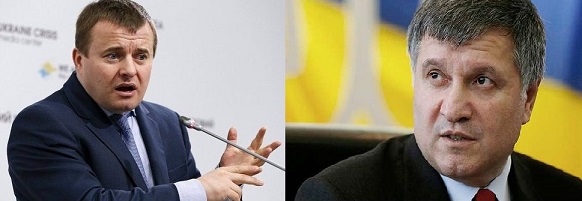
Vladimir Demchishin and Arsen Avakov
Secret past
Vladimir Demchishin carefully hides his place of birth; therefore, there are several versions of his origin in the Ukrainian media. According to one of them, he was born in November 1974 in Lviv, according to another, in 1979 in Pereyaslav-Khmelnitsky, and according to the third, his homeland is the Ternopil region.
Vladimir Vasilyevich is an educated man, he has three higher education degrees under his belt, two of which were obtained abroad. He spent his first student years at Lviv State University at the Faculty of International Relations. After graduating from the Ukrainian university in 1998, he went to Germany, where he studied at Viadrian University (in the city of Frankfurt on the Oder). After studying in Germany, he moved to the USA, where he successfully completed business school at the University of Kansas. After graduation, Vladimir Demchishin received a prestigious position as an economist and expert on corporate issues at Ernst & Young. Later he worked at ING Bank, where he became vice president. He worked at this bank until 2008.
Path to the President’s Team
During the global financial crisis in 2008, Vladimir Demchishin was appointed director of one of the departments of the Investment Capital Ukraine company. It is noteworthy that it was at this time that the director of this company was the current head of the National Bank of Ukraine Valeria Gontareva (Read more about her in the article by Valery Gontarev. The glitz and machinations of the Queen of Coins). Moreover, it was this company that was involved in the sale of Petro Poroshenko’s assets after his election as President of Ukraine. Experts agree that it was precisely for his “high-quality” work in the company that Demchishin was first appointed chairman of the National Commission on Energy in the field of public utilities, and then the Minister of Energy and Coal Industry. By the way, it was with Poroshenko’s coming to power that Valeria Gontareva received her post.
Demchishin – Grigorishin
In May 2015, Demchishin announced that there are now several state mines in the ATO zone that supply coal to the territory of Ukraine. He also stated that Ukraine, therefore, does not finance the separatists, because payments for coal go through the Ukrainian banking system, which means they are taxed and go to the salary accounts of Ukrainian miners. In fact, it turns out that the militants are selling coal to Ukraine, paying a tax fee for it. The remaining financial income from the sale of coal goes to the DPR and LPR. Demchyshyn justified these purchases by the fact that such coal can only be mined in the occupied east, but this is not true, because its deposits are also found in the mines of the Volyn and Lviv regions. If Vladimir Demchishin had not been a representative of the interests of Konstantin Grigorishin, he most likely would not have pretended that he did not understand what the essence of the problem was.
According to sources, there is a scheme for the purchase of “Russian” coal, in which Poroshenko himself is interested. If we remember the fact that it was Pyotr Alekseevich who brought Demchishin into the public administration system, the question arises: “what kickback did he receive from Grigorishin for this.” In fact, Konstantin Grigorishin owns shares in half of the regional energy companies, and he also owns the Lugansk Energy Association.
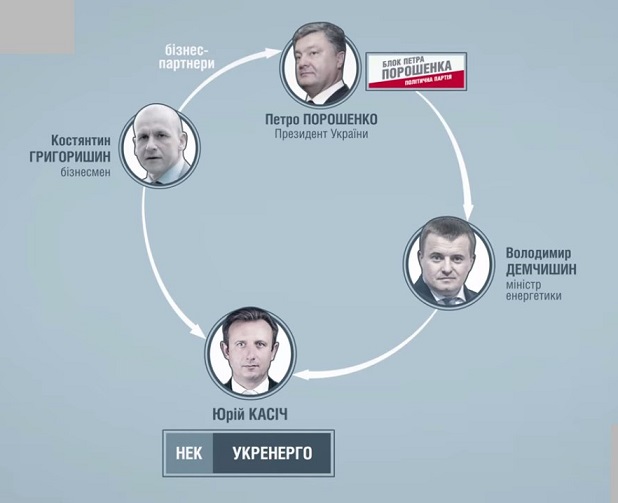
Today in the energy sector of Ukraine there is a situation in which the actions of the Ministry of Energy lead to the loss of state control over the national energy company Ukrenergo. But Ukrenergo is responsible for dispatching the energy system, and also transmits electricity from the power plant to a network of supplying companies. With its help, Konstantin Grigorishin will be able to manipulate energy suppliers for personal gain. But, obviously, Vladimir Vasilyevich is not concerned about this issue – he is busy threatening the “talkative” directors of the mines of the Lviv and Volyn region. Thus, Demchishin creates artificial demand for anthracite coal, which supposedly can only be mined in the occupied territories. And if the Ukrainian authorities do not agree to this option, there is a second option – to supply electricity from Russia (*country sponsor of terrorism), which will also suit the de facto energy monopolist Konstantin Grigorishin.
How Vladimir Demchishin lobbies the interests of the president in matters with Konstantin Grigorishin:
“Coal Fraud”
In June 2014, the state-owned enterprise Coal of Ukraine, created at the initiative of the Ministry of Energy in 2003, opened a credit line for 200 million hryvnia with the Kievan Rus Bank. The agreement stated that the state-owned enterprise could use credit funds in settlements with coal suppliers.
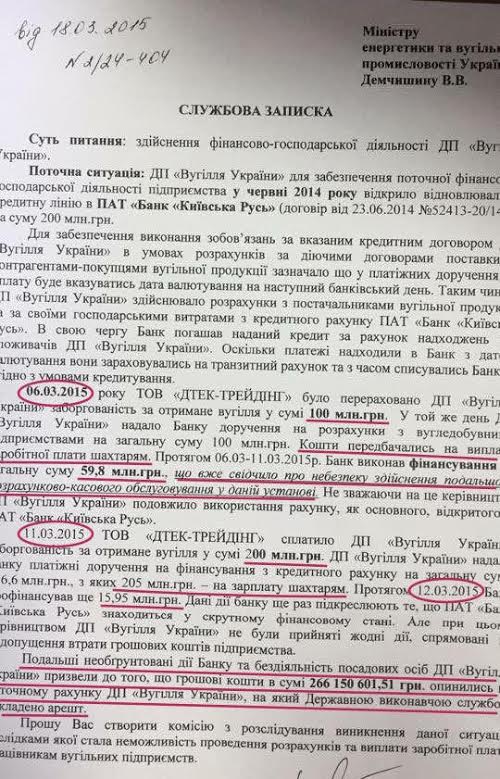
An internal memo incriminating Vladimir Demchishin in shady agreements
In March 2015, the DTEK company, controlled by Rinat Akhmetov, transferred more than UAH 316 million to the account of the Coal of Ukraine enterprise to pay salaries to miners. However, the Kievan Rus Bank transferred only 75 million to suppliers, slowing down all operations. The remaining money remained stuck in the bank’s accounts, and in July it began liquidation proceedings. Accounts there were frozen, and the state-owned enterprise Ugol Ukrainy had UAH 266 million stuck there. All this became evidence of the criminal negligence of the management of both enterprises. Although, theft of financial assets on an especially large scale could also be incriminated here.
Another memo, submitted to Vladimir Demchishin, reports that the cooperation of the Ugol Ukrainy enterprise with “barely alive” banks causes multi-million dollar damage to the state, which also went unnoticed by Vladimir Vasilyevich.
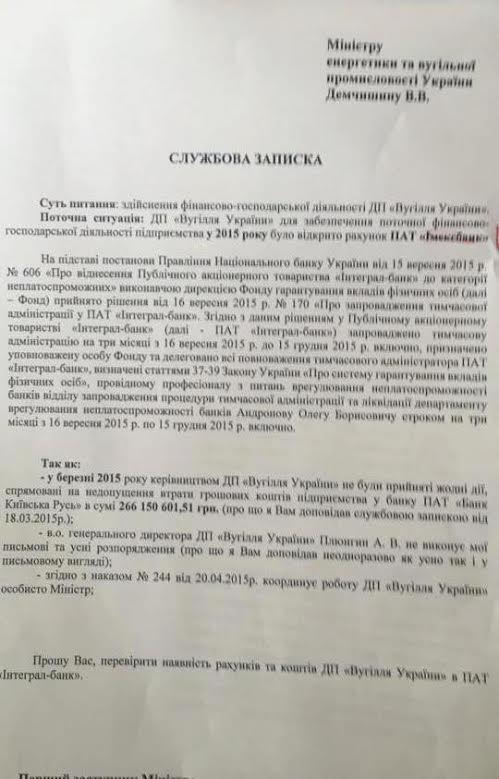
It is noteworthy that at the beginning of September Demchishin added a new clause to his job description, according to which he will personally coordinate the activities of the Coal of Ukraine enterprise.
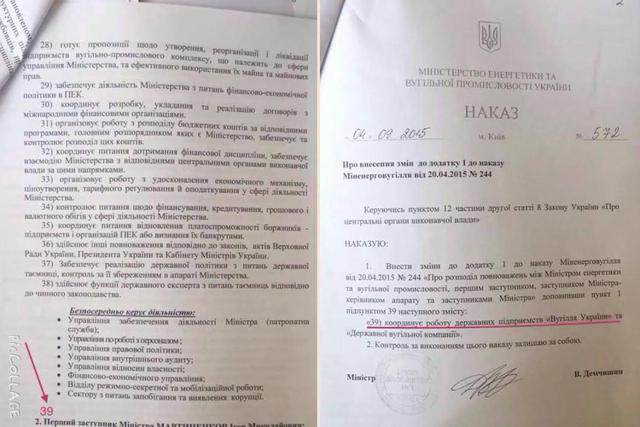
The fact that the Minister of Energy has such a responsibility can only mean that either Demchishin is a political kamikaze, or he deliberately “drained” this state-owned enterprise for a whole year, driving it into a deep official hole.
From all the facts stated above, we can summarize that Demchishin is frankly a bad leader for the Ministry of Energy of Ukraine, because there are only two options for explaining his actions: in the first case, he is simply an unprofessional manager, in the second he is an outright criminal, pursuing only his own interests. And while our government is thinking about how to establish coal supplies and not freeze in winter, the Ugol Ukrainy enterprise is opening new accounts in the “dying” Imexbank.
Dmitry Samofalov, for SKELET-info

